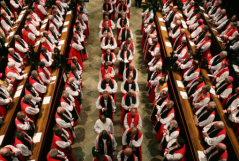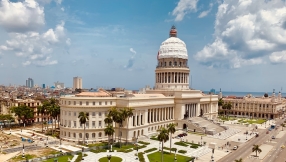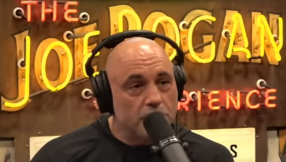A senior Church of England clergyman has called for the Archbishop of Canterbury Justin Welby to apologise for the way the Church has treated homosexuals worldwide.
In an essay for the liberal organisation Modern Church, the Dean of Christ Church Oxford, the Very Rev Martyn Percy, says the relatively small numbers of traditionalists and conservatives who reject same-sex unions and gay marriage in churches are "dictating" the menu for everyone else.
He warns: "The Church of England's stance on sexuality is deeply alienating and quite incomprehensible for most young people in the UK. It confirms their view of religion as being backward-looking and bigoted."

His essay comes as another gay clergyman was banned by a diocese from taking services after marrying his partner.
Jeremy Davies, who had been with his partner for 28 years, was denied "permission to officiate" by the bishop of Winchester after he married Simon McEnery, an opera singer.
Also this year another clergyman, Jeremy Pemberton, lost his claim for discrimination after he was refused permission to officiate by a diocese, a decision that cost him a job offer as an NHS chaplain.
Next month, primates of the worldwide Anglican Communion are meeting in private with the Archbishop of Canterbury to debate a new structure of the worldwide church to help avoid a permanent rift over the issue.
In his essay, Sex, Sense and Non-Sense for Anglicans, Professor Percy, former principal of Cuddesdon, writes that for the worldwide Anglican Communion, sex has become "boring". It is weary, dog-tired and "continuously wracked by insoluble disagreement and divisive dialogues it cannot seem to resolve," he writes.
He describes next month's meeting as "a last-ditch attempt to stop the communion either imploding or exploding."
He compares the issue to women's ordination in the Church of England, where some clergy and congregations have been allowed to exercise freedom of conscience and opt out, with provision made for them. He also notes that some evangelical churches hold services that are in breach of canon law.
"In neither case are these clergy or congregations cast out. They are catered for; or even permitted to self-cater. And although both these groups might claim to hold more firmly to the truth than others, no-one is asked to dine elsewhere, so to speak."
He warns: "No established church can afford to de-nationalise itself on an issue that is now treated as a matter of equality and justice by the state."
A broad church should cater for the entire population, he adds.
In 41 of the 53 countries within the British Commonwealth, homosexual conduct is still regarded as a serious crime, a legal stigmatisation of homosexuality that came from nineteenth century England.
Professor Percy says: "The Archbishop of Canterbury could begin the primates' meeting by accepting responsibility for the part the Church of England has played in perpetrating this discrimination and the subsequent injustices – and publicly repenting of them."
He also challenges the assumption that the dioceses and congregations of the Global South provinces now form the majority, and are the only ones growing numerically citing the new study by the Spanish Anglican academic, Daniel Munoz, that was revealed exclusively in Christian Today earlier this year to suggest this is questionable.
"Conservative Christianity is not the only brand of faith capable of withstanding the onslaught of modernity," he adds. "The right treatment of homosexual people is not a conditional concern to put to a vote of argumentative Archbishops. Remember, this is a fundamental issue of truth and justice."

While the Church of England in its opposition to gay marriage is in alliance with developing nations, it is out of kilter with the rest of the UK, he warns. "The Archbishop knows full well that this is a problem, and here he is caught between a rock and hard place. A theologically conservative church is not an attractive proposition to the emerging generation."
He claims Archbishop Welby is aware that he will not make much headway on evangelism and mission with a church that saddles him with an inherently homophobic polity. "A non-inclusive church is an evangelistic dead-duck."
At next month's meeting, Archbishop Welby has a real opportunity to succeed where Pope Francis recently failed in his Synod.
"Simply put, no matter what his fellow Archbishops think about the right way to talk about homosexuality, there is no case for oppressing lesbian, gay and bisexualpeople under criminal law. In any country, anywhere."
David Mac-Iyalla, the Nigerian gay rights campaigner who had to flee to Britain a decade ago, said on Thinking Anglicans: "Many thanks dear Very Revd Prof Martyn Percy, Dean of Christ Church, Oxford, you speak my mind and that of the many isolated LGBT people from the Global South. I hope those in the Anglican leadership will take your advice seriously. Our Lord Jesus Christ has never in anytime dignified oppressors. Those primates from the Global South who promotes and support criminalising homosexuals in their province are a disgrace to Christianity."














